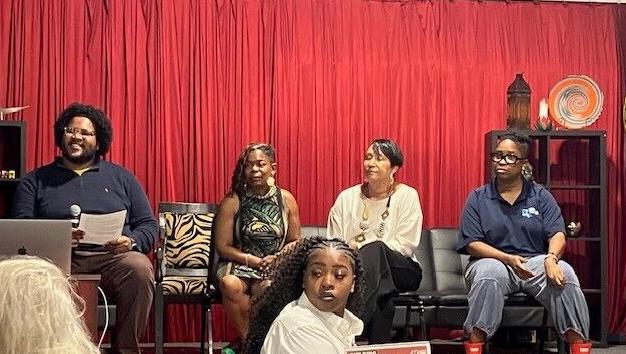Unless you're well off enough to live in a tony New Orleans neighborhood with gates, a neighborhood patrol and lots of crime cameras, you probably have to contend with unkempt homes, overgrown lots, too many potholes and not enough public safety.
Especially if you're Black.
The Ashé Cultural Arts Center is once again proving it is much more than a cultural arts hub. It is also an education, information and empowerment center.
Since the week of Juneteenth, a group of community organizations have been asking citizens to improve life for Black New Orleanians. That probably means fighting the powers that be — all of them. Participants I heard want to take on Republican Gov. Jeff Landry, the GOP's legislative supermajority, Democratic New Orleans Mayor LaToya Cantrell and the all-Democrat City Council.
A series of community-building sessions has brought together a coalition of groups working with Ashé, including PolicyLink, the Power Coalition for Equity and Justice and Step Up Louisiana.
Whether you live in one of the city's nicest neighborhoods or a 'hood where you put a lock on your steering wheel and keep your lights on at night, you're probably concerned about New Orleans' quality of life.
You might be concerned about affordable housing and the unhoused. You might be concerned about health equity and income disparities. Or maybe you're concerned about the quality of education our children receive, what economic justice and criminal justice mean and how "regular" people can make a difference.
Ashé Chief Equity Officer Asali DeVan Ecclesiastes and the Ashé team are working with E Pluribus Unum, Housing NOLA, BE NOLA and the recently formed New Orleans Citizens Committee. Formed earlier this year, the Citizens Committee developed some engagement and guidance principles that the coalition is using for its work. That includes listening to the community as the committee and partner groups build policy positions. When the group went public, they said they would hold a series of community meetings.
I attended the opening gathering at Ashé on Oretha Castle Haley Boulevard on June 18 with about 60 people and again on June 21 for part of a housing-focused program with about 35 folks. I wasn't on-site, but I listened and watched via livestream when the housing conversations continued the next day with about 25 participants.
The sessions were packed with information and insights. Participants were stunned when Power Coalition representatives shared how few people voted in the fall gubernatorial election. They were shocked to hear Andreanecia Morris of Housing NOLA say how much it cost to build per square foot in the city and how that makes homeownership out of reach for some. Inaccurate perceptions were gently corrected.
Jean-Sebatien René, a consultant who lives in Treme, is a father of four. Haitian by birth, his family has been a part of New Orleans since the French owned the city as a colony. "New Orleans raised," he said he attended a Friday night session focused on housing at the TEP Center in the Lower 9th Ward because he cares about the city. He wasn't sure what to expect, but what he heard and saw exceeded anything he thought he might experience. He said Morris "was asking for recruits and I was ready to sign up."
René plans to attend additional sessions. He wants to see more elders participate, too — "people who still listen to the radio," as he described them. He said he would encourage people in his and other neighborhoods to participate.
I sat at a table with Y. Frank Southall and others two Fridays ago. Raised in Cinncinatti and Washington, D.C., Southall has been involved with city housing issues as a volunteer and on staff for about 12 years. He's an organizing community engagement manager with Jane Place, so he attends a lot of community meetings and typically sees many of the same people.
"This one was different," he told me Thursday. "There were a lot more interesting people in the room" who seemed ready to advocate and organize. "That was cool."
Southall hopes 2,000 people might show up when housing issues come before the City Council after these events. Morris told one group that they would gain enough knowledge "to be dangerous."
The next session, set for 5 p.m. on July 19 and July 20, will focus on health equity at the New Orleans East Hospital on Read Boulevard.
These sessions are first and foremost for Black New Orleanians who want better lives for themselves and who want the same for Black New Orleanians. "There's great information sharing no matter what race you are," said Ashe' Community Programs Director Solomon Matthews.
Black, White or other, we all should care enough to get more information and get involved.


















